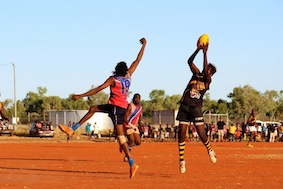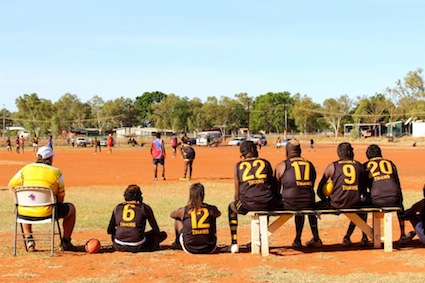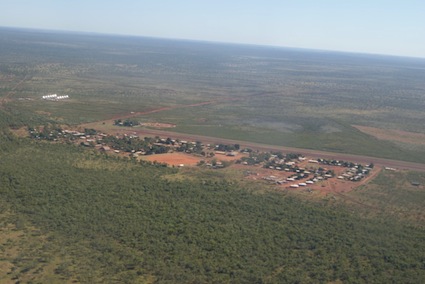Lajamanu Footy – “The lifeblood of the community”
- Saturday, August 24 2013 @ 08:34 pm ACST
- Contributed by: Wesley Hull
- Views: 7,575


The red dust of the Australian outback is the best in the world. Or the worst, depending on your point of view and your direct association with it. But that dust doesn’t dull the love of footy in Lajamanu. In fact, if anything, it just brings out the best in the local footballers as they run, kick, bounce and mark with the same athleticism you would find anywhere else.
For Lajamanu’s AFLNT Regional Development Manager, Ty Ebdon, his journey to this remote outback Northern Territory community has been a life change. The town is nestled on the northern fringes of the Tanami Desert, not far from the border with Western Australia. It is almost 900 kilometres south of Darwin, and 557 kilometres south-west of Katherine. Ty had never experienced this level of isolation before.
From here, Ty can take up the story of Lajamanu footy.
“I have been permanently placed here in Lajamanu since funding from FaCHsia, and the support of AFLNT, formed projects in nine remote NT communities. Originally from Tasmania, I wanted a change, and AFLNT provided me the opportunity of a change that I thought I would never do. From a golf professional in Hobart, to working in a remote community 900kms from Darwin definitely was a change, but it’s been the best experience of my life. It has been amazing. Yes, it’s isolated and hot out here in the Desert, but the opportunity to make a difference to the community through AFL is a great feeling. Especially when you see the young kids having so much fun having a kick around the dirt oval. You can’t wipe the smiles of their faces.”
“Since arriving in February 2012, I was able to form a Junior Boys competition which runs regularly with about 40 plus kids turning up every Tuesday and Thursday to participate. The boys can’t get enough. Additionally, early in 2013 I was able to form a junior girl’s competition which plays on Wednesdays. The girls get very excited to participate in their own competition with some days seeing more than 40 girls come down to have a kick.”
“Local Lajamanu elders started the local Lajamanu Football League in 2008, in a move to get the young men more active and to steer them away from turning to alcohol, and living a healthier lifestyle.”
“Four teams were created to form the Kiwinyi District Football League. The four local teams were Wiyarla Tigers, Centipede Dockers, Central Magpies and Lultju Roos. In 2012 we were able to organise a fifth team to enter the competition. The Gurindji Eagles are from a nearby community approximately 100 kilometres away. Each week games would be played in Lajamanu and every second week a local team would have to travel the 100 kilometres to Kalkarindji to take on the Eagles.”
“The Kiwinyi District Football League is the life blood of the community. For each game during the season most of the community will gather down around the oval to watch the beloved team which they support.”
“The 2012/13 season was the first that I was involved in, with a fantastic season of 20 rounds, then a four round finals series. The grand final came down to the local Wiyarla Tigers taking on the new comers, the Gurindji Eagles (who finished on top of the ladder). In what was a fantastic showcase of their football skills, the day was a fantastic success with in excess of 600 people there to watch the game. The Gurindji Eagles outclassed the Wiyarla Tigers to win their first premiership.”
“The grand final in my opinion was an amazing highlight of my time in Lajamanu. Not only did it showcase how talented they are, but it showed how much football means to not only the players, but their families, their children and the community as a whole. They live and breathe the game of AFL.”

“The Lajamanu community has also been a part of the Katherine District Football League (now called the Big Rivers Football League). The team play under the community name the Lajamanu Swans. It’s a very long way to go to play a game of football, travelling nearly 600 kilometres. The first 120 kilometres is on dirt then the rest on a single lane bitumen road, with many obstacles along the way including massive holes caused by road trains, cows, horses, donkeys and not to mention kangaroos, bush turkeys and more. So to travel the 7/8 hour trip in a bus, play a game of football, and then turn around and come back, is a massive effort.”
“In 2005 and 2008 we showed how much talent is down here with the Lajamanu Swans winning the premiership in both these years. An amazing effort considering the lengths they go to play a game of football. They were also runners up in 2004 and 2006.”
The Lajamanu community also host the Lajamanu Sports Weekend which is run every year in May. This consists of numerous other communities coming to Lajamanu to participate in Men’s Football and Basketball and Women’s Softball and Basketball. What is scheduled to be a 3 day event can end up continuing for 5 or 6 days, due to teams getting up late each day as they were dancing all night with “battle of the bands”. This is a great spectacle and uses sport as an opportunity to not only maintain a healthy lifestyle but to have a good time and catch up with family members from all over the territory.”
“Lajamanu has produced many quality players that have played for NTFL clubs in Darwin. But none are more recognisable than Liam Patrick (the Lajamanu Lightning Bolt) who played for the Lajamanu Swans (BRFL), Wanderers (NTFL) and now the Gold Coast Suns. If Lajamanu can produce more potential AFL players it would be an amazing achievement from a small remote community in NT. Football is their life. I get kids and young men knocking on my door every night for a football, or to pump up a ball. It’s just a game they can’t get enough of, whether it’s during the day or at night where they play the game board game in the basketball court: a game which has football rules but uses the back boards as goals for each team, so they can play footy for all hours into the night.”
Lajamanu footy is just so adaptable. Whether it be the pounding of feet through the red dust, creating great clouds as packs chase the ball, or midnight variances on the basketball courts, the people of Lajamanu stand as tremendous lovers and followers of the greatest game of all.
And hats off to Ty, who has managed a new life and career developing footy in one of Australia’s most remote locations.



 RSS news
RSS news Twitter
Twitter Facebook
Facebook